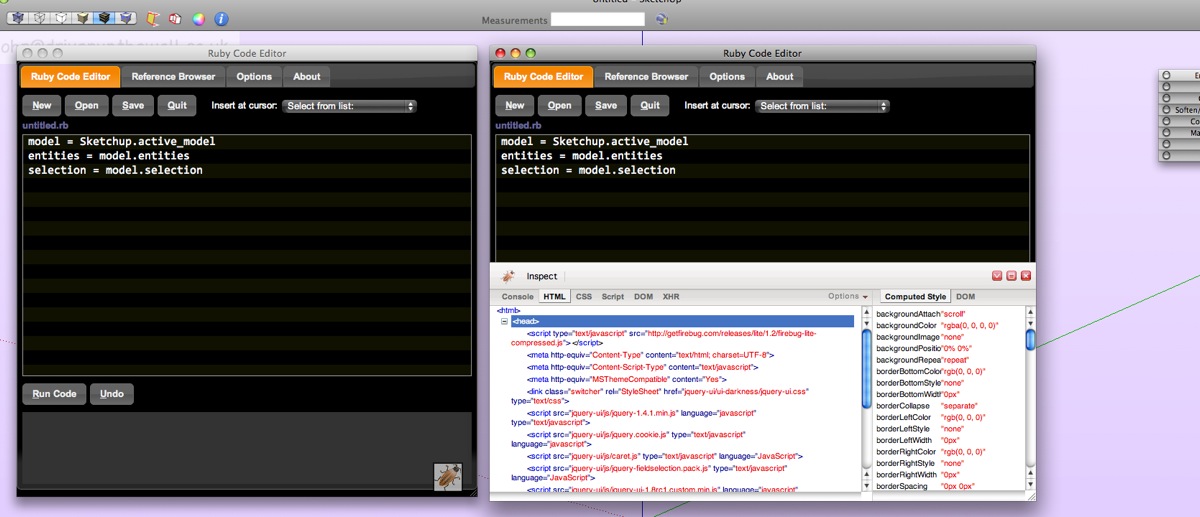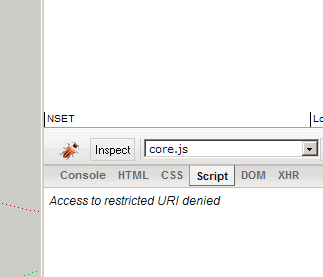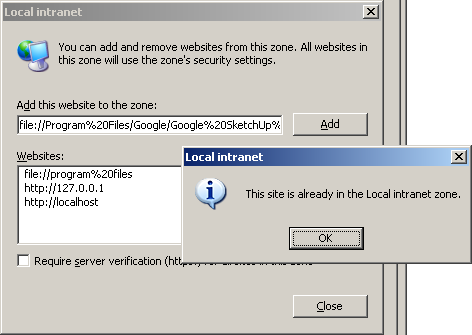HELP setting up a SU code editor
-
@driven said:
Martin, I hope you saw my apology, and perceive it as such. I put your absence down to workload and it hadn't occurred that I may have 'driven' you away... thanks for pointing it out jessejames
Thanks John for apologizing and i now hold a great respect for you. Anyone can make mistakes, but only the truly honorable have the capacity to admit them. Thank you!
-
@chris fullmer said:
... Is it common?
I am not really qualified to participate in this debate but my experience may be helpful in the light of Chris's comment.
I have published two plugins - cgScenes and nset SketchupAPI and I am working on an expansion of these to provide deeper hierarchies and greater control of scenes and components, unlimited links to data from local and remote sources and analytical animation.
These use web dialogs, which seem to me to be an important link to get Sketchup models to the general population to serve as transporters of reusable data. cgScenes works on a Mac only because of extensive work by John [driven]. The problem with the other two seems (I think) to come from conversion of data stored in JSONotation.
So whether or not you acknowledge my approach, problems with two important parts of current technology - the web and efficient data transfer - should be recognised in relation to Sketchup, Macs and PCs.
Incompatibility may indeed be not common. If so perhaps the reason is fear of the unknown, supported by many threads here recounting the horrors. I think John has a great and noble idea how to overcome or at least find the causes of these problems and I sincerely hope you will all work together to find the means.
Please don't shout or shoot at me; I am only an aging reluctant (and amateur) coder.
-
hi all still interested,
I've continued pursuing a SU external editor, and currently am trying to set up http://www.jetbrains.com/ruby/features/ruby_ide.html which although not free has great potential for the sorts of things being done on SU rubies. don't let the Rails credentials put you of this an almost infinitely tunable rudy ide, and settings can be shared, so once one person has the right SU build, others could try it out, tweek it more, write plugs, sounds a bit like SU.... Very powerful in the right hands but tunable for beginners. Have a look.
In the mean time I did a little experiment with Alex's Ruby Code Editor and I thought some might be interested,

it is a live editor, not photoshop, http://getfirebug.com/firebuglite it's in beta, I've only just installed it so can't report on it's full potental
john
-
That IS interesting John.
But it's only for coding and testing WebDialogs (not Ruby.)
By running in Alex's Code Editor, only Alex's Code Editor is being debugged.
But it may have promise.
@ThomThom: You may find this interesting, Firebug extension for jQuery development: http://firequery.binaryage.com/
-
@dan rathbun said:
@ThomThom: You may find this interesting, Firebug extension for jQuery development: http://firequery.binaryage.com/


Nice find!
Hope it will eventually also work with Firebug Lite. -
@dan rathbun said:
That IS interesting John.
By running in Alex's Code Editor, only Alex's Code Editor is being debugged.Hi Dan,
I've been using it to help debug Chris Glasier's nSet for Mac use, but in the process I tried it on 3 or 4 WebDiolog
based rubies and it seems a very useful debug tool, for that type of interactive ruby that is popular... and usually PC only. it does report .rb errors (in relation to itself)I was actually trying to put syntax highlighting into RCE using a similar approach, and though I'd try this as a practice run. I should point it to my url.local and run more features, but I haven't stopped using it long enough yet...
has any one tried Ruby-Mine yet??
john
-
@driven said:
has any one tried Ruby-Mine yet??
Afraid not. The last week I was deep into getting to grips with C programming.
So much to try out - so little time.
-
This relates to FireBugLite.
Can anyone tell me why this happens:

and how to change what so I can see the code.
Thanks
-
@Chris: Do you have nsetWebDialog.set_full_security= true or false ??
(It defaults to false if you don't explicitly set it.) -
@Chris: In your webpage for nset, it would easier if you assign an ID to the SCRIPT element(s) that load the external javascript files.
%(#804000)[<SCRIPT ID='nset_core_js' LINK='..path../core.js'>]Then in Firebug Lite, try inspecting by ID. Enter the ID name in the inspect control box. If that doesn't work, try entering:
document.getElementById('nset_core_js') -
Firebug page(s) to bookmark:
http://getfirebug.com/wiki/index.php/Main_Pagehttp://getfirebug.com/wiki/index.php/Firebug_Lite
Forum - Google Groups [EDIT-Added]
http://groups.google.com/group/firebug -
@chrisglasier said:
Can anyone tell me why this happens:
@unknownuser said:
Access to restricted URI denied
I suspect what's happening, is MSIE copies the code into the "Temporary Internet Files" folder, which is usually a Restricted Sites Zone (security-wise.) I've tried (in the past,) to add a specific local folder to my "Trusted Sites Zone" but MSIE refuses.
-
@dan rathbun said:
... but MSIE refuses.
Thanks for all your suggestions, which I tried ... but as you said MSIE refuses. No FireBugLite at the end of the tunnel.
Thanks again.
-
@dan rathbun said:
@chrisglasier said:
Can anyone tell me why this happens:
@unknownuser said:
Access to restricted URI denied
I suspect what's happening, is MSIE copies the code into the "Temporary Internet Files" folder, which is usually a Restricted Sites Zone (security-wise.) I've tried (in the past,) to add a specific local folder to my "Trusted Sites Zone" but MSIE refuses.
@Chris !!
I think I was always trying the wrong thing! I was supposed to be adding the local folder to the LIZ ("Local Intranet Zone".)
I stumbled upon this paper:
http://msdn.microsoft.com/en-us/library/bb250483(v=VS.85).aspxSo retry, go to Internet Options > Security (tab)
Hilight "Local intranet", click the "Sites" button.
On the "Local Intranet" dialog, click the "Advanced" button.
See if the folder (beginning "file://") to your JS code is in the "Websites:" list, if not, add it.See if that helps FirebugLite find your JS scripts.
-
Thanks Dan I will try that and let you know (I'm at GMT + 8 btw)
-
Here's what I got in IE:

and still access denied in FireBugLite
So I don't know
-
I did a search on the aptana site for "sketchup" and didn't find anything.
Are there any installation instructions on how to pair up aptana and sketchup?@thomthom said:
That's an interesting article.
@unknownuser said:
You can download Aptana Studio and RadRails, but the installation process is long and complicated. Besides, if you just want a Ruby editor, downloading a 30-day evaluation version of the gigantic Aptana Studio isn't worth it.
Complicated installation process? And the thing is free. http://www.aptana.org/
Anyway - are you able to set breakpoints etc in SU plugin scripts and run them from Eclipse?
Advertisement







